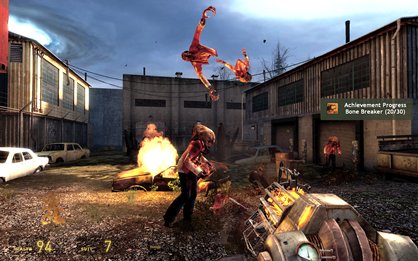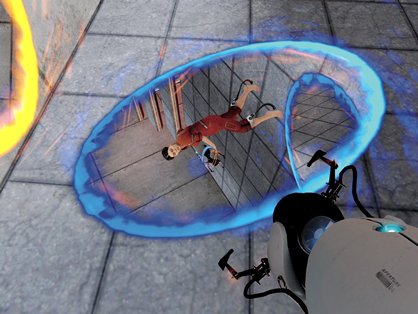Why games fail at storytelling
It's not just about bad acting and Jill sandwiches
Neverending story
So what's the solution? Well it's simple. Games need to tell stories in their own way. Just as a radio play would fail if directly ported as a movie and a movie physically cannot exist as a novel, so games need to find their own language and methods for storytelling.
Thankfully, technology and design skill are finally catching up to the point where this is possible. We now have examples of stories that play out through in-game action rather than jarring animated dictation, and while that approach takes a great deal of skill to pull off, it's true videogame storytelling, by the game, through the game.

Above: Gordon Freeman never says a word, but that's exactly why you'll become insanely attached to him
Valve is particularly good at this. Consider Half-Life 2 and Portal. Both incredibly affecting, story-driven games, neither of which features a single cut-scene. Instead, Valve pushes on the story through either real-time, in-game conversations or interactive events during the in-game action. And that method doesn't just serve to further the story more believably. With Valve's silent protagonists allowing us to completely imprint our own personalities and values upon them, the fact that key story elements unfold through actions we have direct involvement with means that we essentially are that character, doing what they do and reacting with genuine emotion as a hybrid of us and them.
Consider how intelligently and subtly Half-Life 2 manipulates that model to create attachment and emotion. Near the end of the game, we/Gordon find our/himself captured by the Combine on their own turf. In a cunning bit of design, the Combine take our gravity gun, the signature tool which has become the key to our physical interaction with the game world, as well as the weapon that has provided the most fun. In a way we define ourselves/Gordon by it, and the theft is a major affront to us/him.

Above: You are Chell and Chell is you. GlaDOS really helps form that bond
Sign up to the GamesRadar+ Newsletter
Weekly digests, tales from the communities you love, and more
Then something goes wrong and we get it back in super-charged, soldier-throwing form. Immediately we/he are/is doubly-empowered by the return of not only a weapon but a part of our shared in-game identity. Its souped-up strength and the following orgy of wanton destruction it facilitates are an empowering, vindicating, and most importantly personally identifying sequence which puts us in exactly the right heroic, indignant mood for the final confrontation.
Or what about Portal? GlaDOS' snark and jibing might be damn funny, but it also subtly builds an underlying dominant/submissive relationship between herself and us/Chell. Naturally that imbues us/Chell with a simmering rebellious instinct, which we're finally allowed to revel in when the action switches to the 'forbidden' areas outside of the test chambers.
We're in a place we're not supposed to be. The gameplay becomes uninstructed and unrestricted. GlaDOS' incursions lose their authority. We've turned the tables, and rather than fearing the computer and wanting to escape her omnipotence, we're now rushing to confront her in rebellious exhilaration. Infinitely more effective than a "And then Chell escaped from the fire pit and went to find GlaDOS" animation, we're sure you'll agree.

Above: Far Cry 2 sets a standard for organic, player-driven storytelling
And then there's that pinnacle of videogame storytelling; the malleable narrative. As the only truly interactive entertainment medium, only games can do this. As such, it should become the calling card which defines gaming against the other media. Branching dialogue and alternative level routes have been around for ages of course, but the technique is really beginning to mature now.
The upcoming Far Cry 2 has ten playable characters. The nine you don't choose will turn up as NPCs throughout the - entirely action-driven - story. They'll offer you side-stories. They'll call you during missions, offering alternative methods of completion or even ways to betray your paymasters by taking a different course of action. Anything you agree to, or not, is entirely up to you. You can befriend these people, you can fight alongside with them, you can ignore them, or you can kill them off. The game always adapts to your developing relationships and the surviving cast list, and integrates everything into the main plot flawlessly.
And that friends, is how a videogame tells a story. So let's have the confidence to show off what we can really do from now on, shall we?


Gordon Freeman: Strongest personality in gaming
How Valve created the most complex and best-realised character in videogames without any dialogue

The best videogame stories ever
15 end-all, be-all of tales to titillate your inner literary critic. Did your favorite make the list?

Epic game plots made simple
Gaming's most dizzying plots for dummies



